Assessing IFRS Adoption Implications in India: Dissertation Proposal
VerifiedAdded on 2020/02/03
|9
|1958
|93
Project
AI Summary
This dissertation proposal examines the implications of adopting International Financial Reporting Standards (IFRS) in India, a developing country. The project aims to investigate the factors encouraging businesses to adopt IFRS, the benefits Indian companies can gain, and the challenges they may face during implementation. The proposal includes a literature review discussing the evolution and adoption of IFRS in India, benefits, and challenges. The research methodology outlines a qualitative case study approach, using secondary data sources for analysis. The study employs a thematic perception test to identify patterns, challenges, and opportunities related to IFRS implementation in the Indian corporate sector. The proposal also provides a detailed timeline for the research process and lists relevant references.
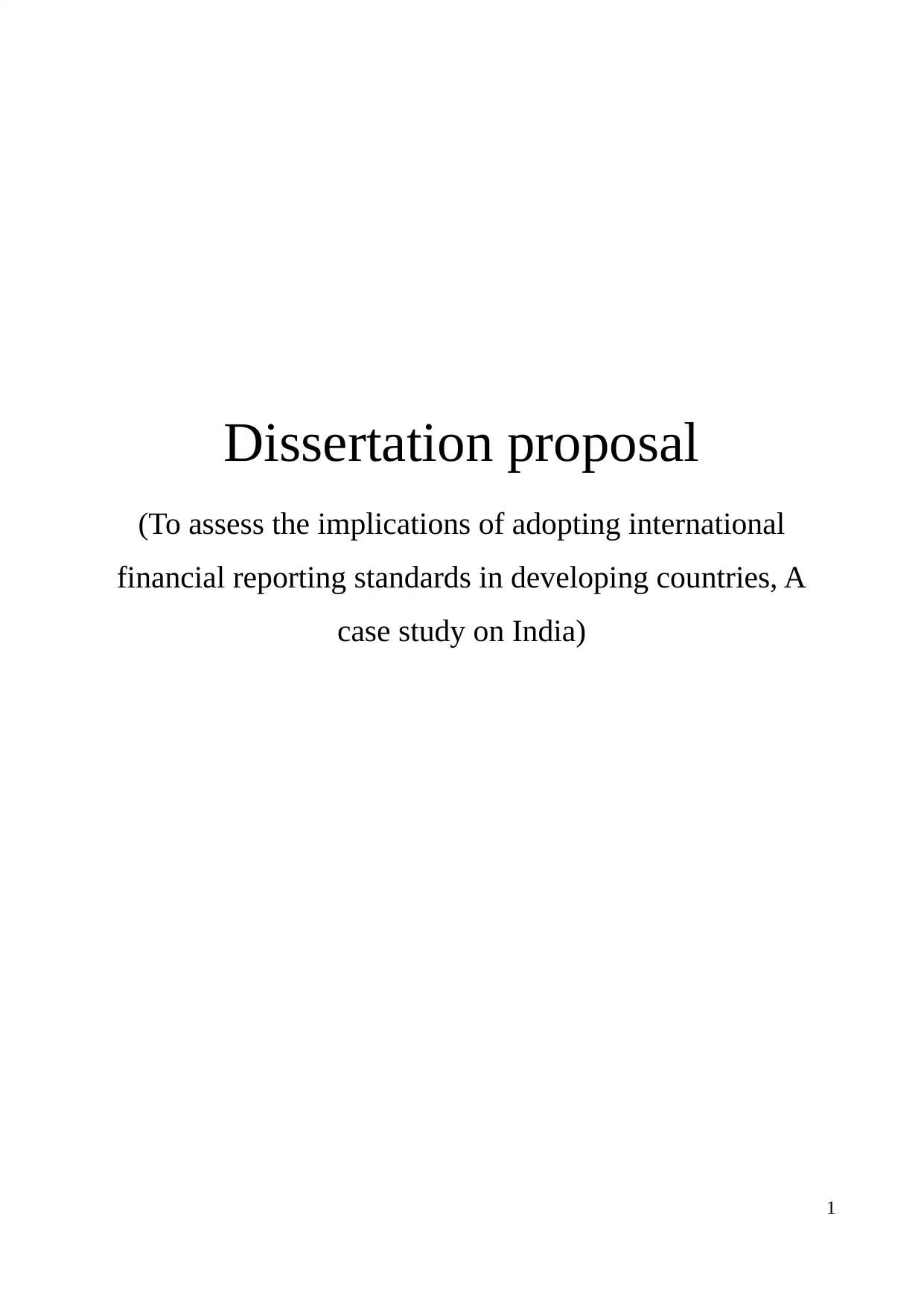
Dissertation proposal
(To assess the implications of adopting international
financial reporting standards in developing countries, A
case study on India)
1
(To assess the implications of adopting international
financial reporting standards in developing countries, A
case study on India)
1
Paraphrase This Document
Need a fresh take? Get an instant paraphrase of this document with our AI Paraphraser
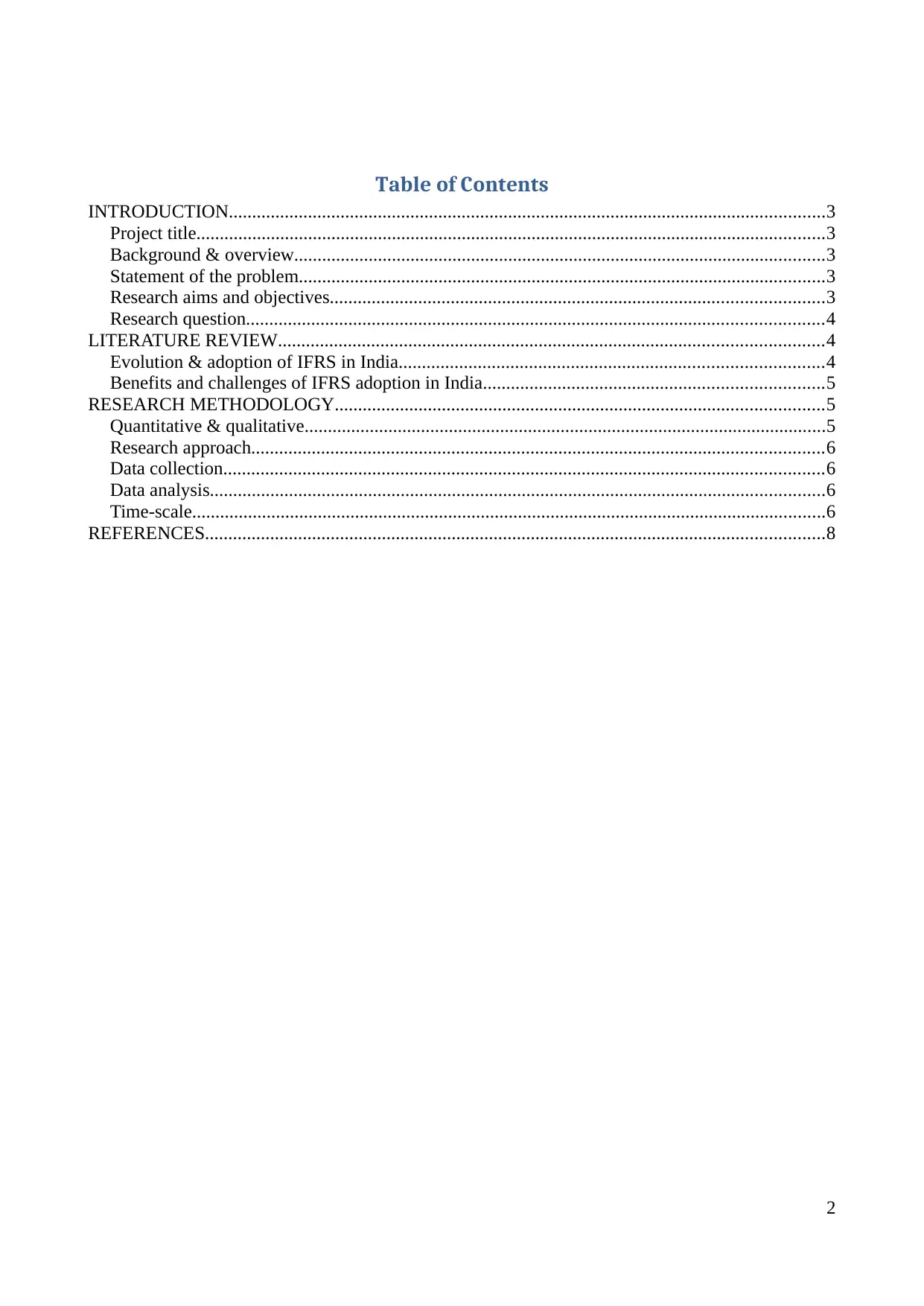
Table of Contents
INTRODUCTION................................................................................................................................3
Project title.......................................................................................................................................3
Background & overview..................................................................................................................3
Statement of the problem.................................................................................................................3
Research aims and objectives..........................................................................................................3
Research question............................................................................................................................4
LITERATURE REVIEW.....................................................................................................................4
Evolution & adoption of IFRS in India...........................................................................................4
Benefits and challenges of IFRS adoption in India.........................................................................5
RESEARCH METHODOLOGY.........................................................................................................5
Quantitative & qualitative................................................................................................................5
Research approach...........................................................................................................................6
Data collection.................................................................................................................................6
Data analysis....................................................................................................................................6
Time-scale........................................................................................................................................6
REFERENCES.....................................................................................................................................8
2
INTRODUCTION................................................................................................................................3
Project title.......................................................................................................................................3
Background & overview..................................................................................................................3
Statement of the problem.................................................................................................................3
Research aims and objectives..........................................................................................................3
Research question............................................................................................................................4
LITERATURE REVIEW.....................................................................................................................4
Evolution & adoption of IFRS in India...........................................................................................4
Benefits and challenges of IFRS adoption in India.........................................................................5
RESEARCH METHODOLOGY.........................................................................................................5
Quantitative & qualitative................................................................................................................5
Research approach...........................................................................................................................6
Data collection.................................................................................................................................6
Data analysis....................................................................................................................................6
Time-scale........................................................................................................................................6
REFERENCES.....................................................................................................................................8
2
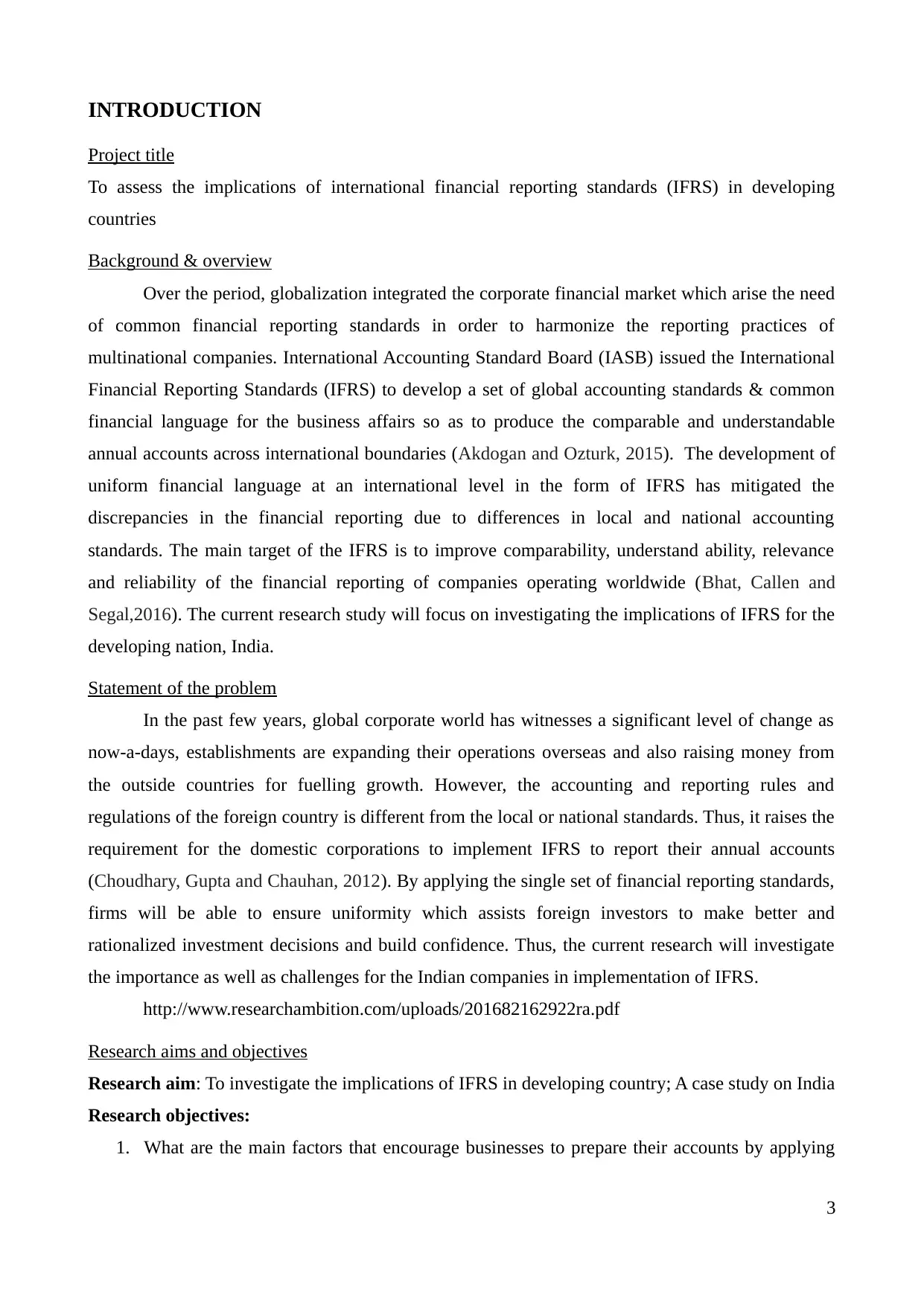
INTRODUCTION
Project title
To assess the implications of international financial reporting standards (IFRS) in developing
countries
Background & overview
Over the period, globalization integrated the corporate financial market which arise the need
of common financial reporting standards in order to harmonize the reporting practices of
multinational companies. International Accounting Standard Board (IASB) issued the International
Financial Reporting Standards (IFRS) to develop a set of global accounting standards & common
financial language for the business affairs so as to produce the comparable and understandable
annual accounts across international boundaries (Akdogan and Ozturk, 2015). The development of
uniform financial language at an international level in the form of IFRS has mitigated the
discrepancies in the financial reporting due to differences in local and national accounting
standards. The main target of the IFRS is to improve comparability, understand ability, relevance
and reliability of the financial reporting of companies operating worldwide (Bhat, Callen and
Segal,2016). The current research study will focus on investigating the implications of IFRS for the
developing nation, India.
Statement of the problem
In the past few years, global corporate world has witnesses a significant level of change as
now-a-days, establishments are expanding their operations overseas and also raising money from
the outside countries for fuelling growth. However, the accounting and reporting rules and
regulations of the foreign country is different from the local or national standards. Thus, it raises the
requirement for the domestic corporations to implement IFRS to report their annual accounts
(Choudhary, Gupta and Chauhan, 2012). By applying the single set of financial reporting standards,
firms will be able to ensure uniformity which assists foreign investors to make better and
rationalized investment decisions and build confidence. Thus, the current research will investigate
the importance as well as challenges for the Indian companies in implementation of IFRS.
http://www.researchambition.com/uploads/201682162922ra.pdf
Research aims and objectives
Research aim: To investigate the implications of IFRS in developing country; A case study on India
Research objectives:
1. What are the main factors that encourage businesses to prepare their accounts by applying
3
Project title
To assess the implications of international financial reporting standards (IFRS) in developing
countries
Background & overview
Over the period, globalization integrated the corporate financial market which arise the need
of common financial reporting standards in order to harmonize the reporting practices of
multinational companies. International Accounting Standard Board (IASB) issued the International
Financial Reporting Standards (IFRS) to develop a set of global accounting standards & common
financial language for the business affairs so as to produce the comparable and understandable
annual accounts across international boundaries (Akdogan and Ozturk, 2015). The development of
uniform financial language at an international level in the form of IFRS has mitigated the
discrepancies in the financial reporting due to differences in local and national accounting
standards. The main target of the IFRS is to improve comparability, understand ability, relevance
and reliability of the financial reporting of companies operating worldwide (Bhat, Callen and
Segal,2016). The current research study will focus on investigating the implications of IFRS for the
developing nation, India.
Statement of the problem
In the past few years, global corporate world has witnesses a significant level of change as
now-a-days, establishments are expanding their operations overseas and also raising money from
the outside countries for fuelling growth. However, the accounting and reporting rules and
regulations of the foreign country is different from the local or national standards. Thus, it raises the
requirement for the domestic corporations to implement IFRS to report their annual accounts
(Choudhary, Gupta and Chauhan, 2012). By applying the single set of financial reporting standards,
firms will be able to ensure uniformity which assists foreign investors to make better and
rationalized investment decisions and build confidence. Thus, the current research will investigate
the importance as well as challenges for the Indian companies in implementation of IFRS.
http://www.researchambition.com/uploads/201682162922ra.pdf
Research aims and objectives
Research aim: To investigate the implications of IFRS in developing country; A case study on India
Research objectives:
1. What are the main factors that encourage businesses to prepare their accounts by applying
3
⊘ This is a preview!⊘
Do you want full access?
Subscribe today to unlock all pages.

Trusted by 1+ million students worldwide
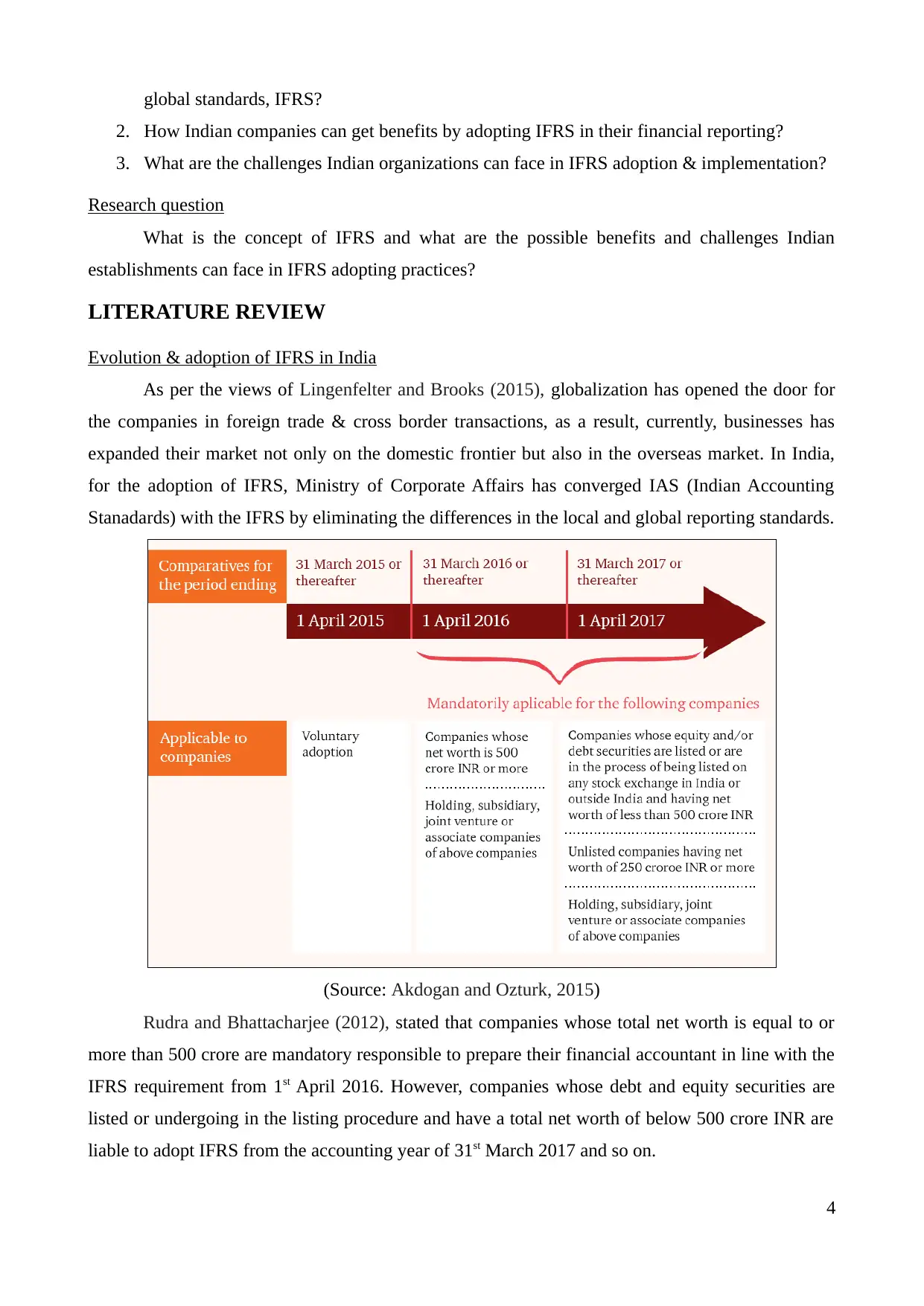
global standards, IFRS?
2. How Indian companies can get benefits by adopting IFRS in their financial reporting?
3. What are the challenges Indian organizations can face in IFRS adoption & implementation?
Research question
What is the concept of IFRS and what are the possible benefits and challenges Indian
establishments can face in IFRS adopting practices?
LITERATURE REVIEW
Evolution & adoption of IFRS in India
As per the views of Lingenfelter and Brooks (2015), globalization has opened the door for
the companies in foreign trade & cross border transactions, as a result, currently, businesses has
expanded their market not only on the domestic frontier but also in the overseas market. In India,
for the adoption of IFRS, Ministry of Corporate Affairs has converged IAS (Indian Accounting
Stanadards) with the IFRS by eliminating the differences in the local and global reporting standards.
(Source: Akdogan and Ozturk, 2015)
Rudra and Bhattacharjee (2012), stated that companies whose total net worth is equal to or
more than 500 crore are mandatory responsible to prepare their financial accountant in line with the
IFRS requirement from 1st April 2016. However, companies whose debt and equity securities are
listed or undergoing in the listing procedure and have a total net worth of below 500 crore INR are
liable to adopt IFRS from the accounting year of 31st March 2017 and so on.
4
2. How Indian companies can get benefits by adopting IFRS in their financial reporting?
3. What are the challenges Indian organizations can face in IFRS adoption & implementation?
Research question
What is the concept of IFRS and what are the possible benefits and challenges Indian
establishments can face in IFRS adopting practices?
LITERATURE REVIEW
Evolution & adoption of IFRS in India
As per the views of Lingenfelter and Brooks (2015), globalization has opened the door for
the companies in foreign trade & cross border transactions, as a result, currently, businesses has
expanded their market not only on the domestic frontier but also in the overseas market. In India,
for the adoption of IFRS, Ministry of Corporate Affairs has converged IAS (Indian Accounting
Stanadards) with the IFRS by eliminating the differences in the local and global reporting standards.
(Source: Akdogan and Ozturk, 2015)
Rudra and Bhattacharjee (2012), stated that companies whose total net worth is equal to or
more than 500 crore are mandatory responsible to prepare their financial accountant in line with the
IFRS requirement from 1st April 2016. However, companies whose debt and equity securities are
listed or undergoing in the listing procedure and have a total net worth of below 500 crore INR are
liable to adopt IFRS from the accounting year of 31st March 2017 and so on.
4
Paraphrase This Document
Need a fresh take? Get an instant paraphrase of this document with our AI Paraphraser
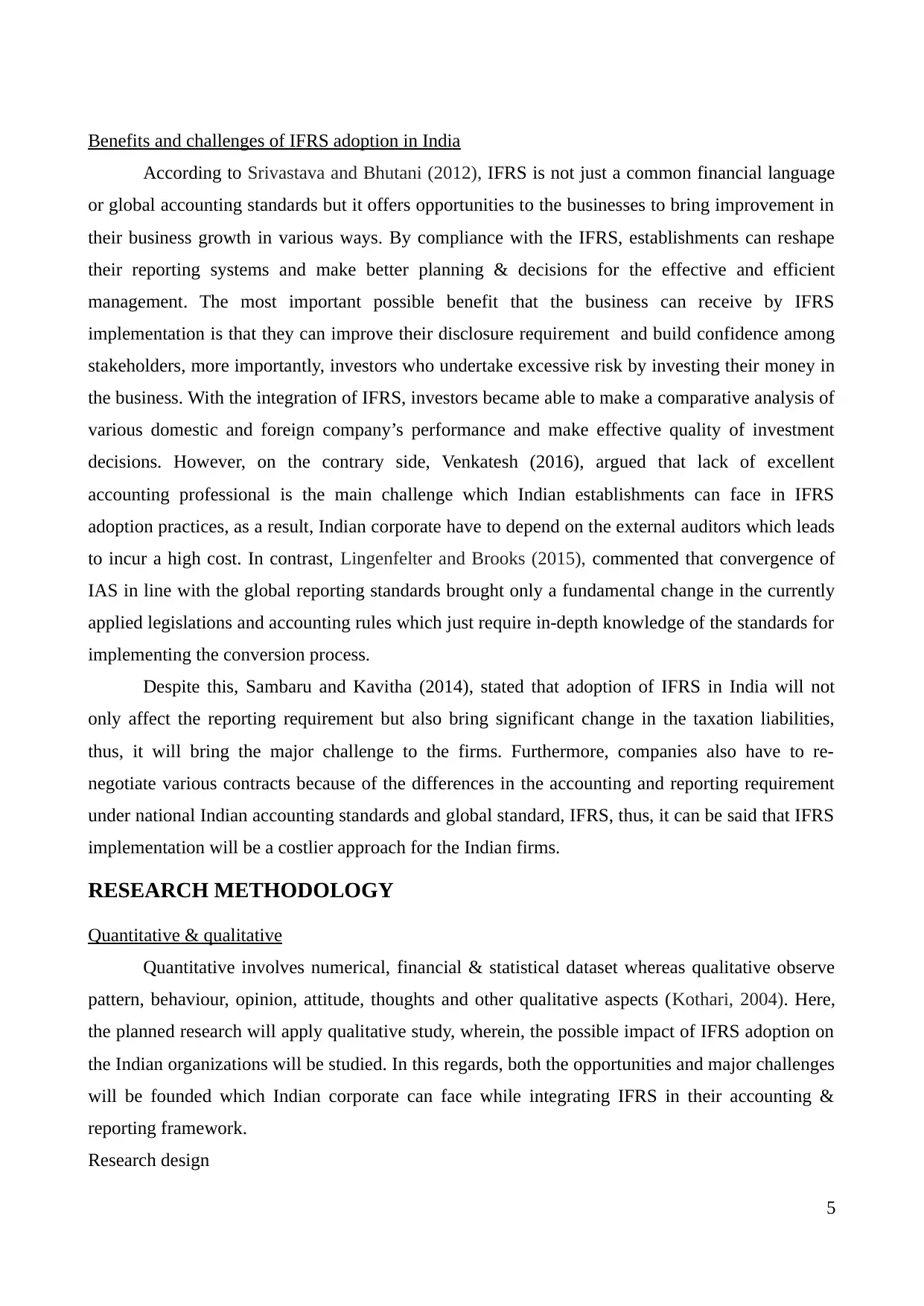
Benefits and challenges of IFRS adoption in India
According to Srivastava and Bhutani (2012), IFRS is not just a common financial language
or global accounting standards but it offers opportunities to the businesses to bring improvement in
their business growth in various ways. By compliance with the IFRS, establishments can reshape
their reporting systems and make better planning & decisions for the effective and efficient
management. The most important possible benefit that the business can receive by IFRS
implementation is that they can improve their disclosure requirement and build confidence among
stakeholders, more importantly, investors who undertake excessive risk by investing their money in
the business. With the integration of IFRS, investors became able to make a comparative analysis of
various domestic and foreign company’s performance and make effective quality of investment
decisions. However, on the contrary side, Venkatesh (2016), argued that lack of excellent
accounting professional is the main challenge which Indian establishments can face in IFRS
adoption practices, as a result, Indian corporate have to depend on the external auditors which leads
to incur a high cost. In contrast, Lingenfelter and Brooks (2015), commented that convergence of
IAS in line with the global reporting standards brought only a fundamental change in the currently
applied legislations and accounting rules which just require in-depth knowledge of the standards for
implementing the conversion process.
Despite this, Sambaru and Kavitha (2014), stated that adoption of IFRS in India will not
only affect the reporting requirement but also bring significant change in the taxation liabilities,
thus, it will bring the major challenge to the firms. Furthermore, companies also have to re-
negotiate various contracts because of the differences in the accounting and reporting requirement
under national Indian accounting standards and global standard, IFRS, thus, it can be said that IFRS
implementation will be a costlier approach for the Indian firms.
RESEARCH METHODOLOGY
Quantitative & qualitative
Quantitative involves numerical, financial & statistical dataset whereas qualitative observe
pattern, behaviour, opinion, attitude, thoughts and other qualitative aspects (Kothari, 2004). Here,
the planned research will apply qualitative study, wherein, the possible impact of IFRS adoption on
the Indian organizations will be studied. In this regards, both the opportunities and major challenges
will be founded which Indian corporate can face while integrating IFRS in their accounting &
reporting framework.
Research design
5
According to Srivastava and Bhutani (2012), IFRS is not just a common financial language
or global accounting standards but it offers opportunities to the businesses to bring improvement in
their business growth in various ways. By compliance with the IFRS, establishments can reshape
their reporting systems and make better planning & decisions for the effective and efficient
management. The most important possible benefit that the business can receive by IFRS
implementation is that they can improve their disclosure requirement and build confidence among
stakeholders, more importantly, investors who undertake excessive risk by investing their money in
the business. With the integration of IFRS, investors became able to make a comparative analysis of
various domestic and foreign company’s performance and make effective quality of investment
decisions. However, on the contrary side, Venkatesh (2016), argued that lack of excellent
accounting professional is the main challenge which Indian establishments can face in IFRS
adoption practices, as a result, Indian corporate have to depend on the external auditors which leads
to incur a high cost. In contrast, Lingenfelter and Brooks (2015), commented that convergence of
IAS in line with the global reporting standards brought only a fundamental change in the currently
applied legislations and accounting rules which just require in-depth knowledge of the standards for
implementing the conversion process.
Despite this, Sambaru and Kavitha (2014), stated that adoption of IFRS in India will not
only affect the reporting requirement but also bring significant change in the taxation liabilities,
thus, it will bring the major challenge to the firms. Furthermore, companies also have to re-
negotiate various contracts because of the differences in the accounting and reporting requirement
under national Indian accounting standards and global standard, IFRS, thus, it can be said that IFRS
implementation will be a costlier approach for the Indian firms.
RESEARCH METHODOLOGY
Quantitative & qualitative
Quantitative involves numerical, financial & statistical dataset whereas qualitative observe
pattern, behaviour, opinion, attitude, thoughts and other qualitative aspects (Kothari, 2004). Here,
the planned research will apply qualitative study, wherein, the possible impact of IFRS adoption on
the Indian organizations will be studied. In this regards, both the opportunities and major challenges
will be founded which Indian corporate can face while integrating IFRS in their accounting &
reporting framework.
Research design
5
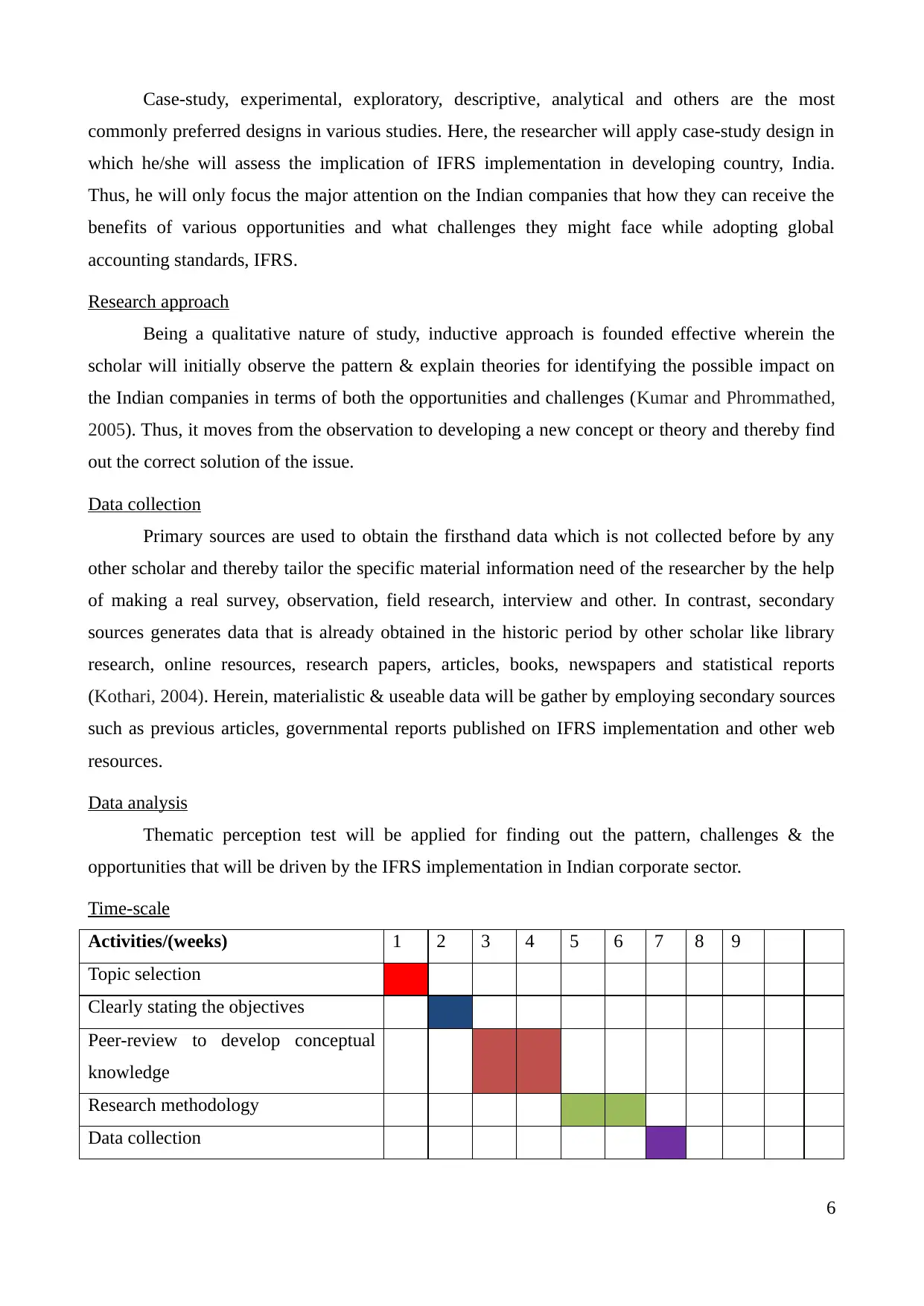
Case-study, experimental, exploratory, descriptive, analytical and others are the most
commonly preferred designs in various studies. Here, the researcher will apply case-study design in
which he/she will assess the implication of IFRS implementation in developing country, India.
Thus, he will only focus the major attention on the Indian companies that how they can receive the
benefits of various opportunities and what challenges they might face while adopting global
accounting standards, IFRS.
Research approach
Being a qualitative nature of study, inductive approach is founded effective wherein the
scholar will initially observe the pattern & explain theories for identifying the possible impact on
the Indian companies in terms of both the opportunities and challenges (Kumar and Phrommathed,
2005). Thus, it moves from the observation to developing a new concept or theory and thereby find
out the correct solution of the issue.
Data collection
Primary sources are used to obtain the firsthand data which is not collected before by any
other scholar and thereby tailor the specific material information need of the researcher by the help
of making a real survey, observation, field research, interview and other. In contrast, secondary
sources generates data that is already obtained in the historic period by other scholar like library
research, online resources, research papers, articles, books, newspapers and statistical reports
(Kothari, 2004). Herein, materialistic & useable data will be gather by employing secondary sources
such as previous articles, governmental reports published on IFRS implementation and other web
resources.
Data analysis
Thematic perception test will be applied for finding out the pattern, challenges & the
opportunities that will be driven by the IFRS implementation in Indian corporate sector.
Time-scale
Activities/(weeks) 1 2 3 4 5 6 7 8 9
Topic selection
Clearly stating the objectives
Peer-review to develop conceptual
knowledge
Research methodology
Data collection
6
commonly preferred designs in various studies. Here, the researcher will apply case-study design in
which he/she will assess the implication of IFRS implementation in developing country, India.
Thus, he will only focus the major attention on the Indian companies that how they can receive the
benefits of various opportunities and what challenges they might face while adopting global
accounting standards, IFRS.
Research approach
Being a qualitative nature of study, inductive approach is founded effective wherein the
scholar will initially observe the pattern & explain theories for identifying the possible impact on
the Indian companies in terms of both the opportunities and challenges (Kumar and Phrommathed,
2005). Thus, it moves from the observation to developing a new concept or theory and thereby find
out the correct solution of the issue.
Data collection
Primary sources are used to obtain the firsthand data which is not collected before by any
other scholar and thereby tailor the specific material information need of the researcher by the help
of making a real survey, observation, field research, interview and other. In contrast, secondary
sources generates data that is already obtained in the historic period by other scholar like library
research, online resources, research papers, articles, books, newspapers and statistical reports
(Kothari, 2004). Herein, materialistic & useable data will be gather by employing secondary sources
such as previous articles, governmental reports published on IFRS implementation and other web
resources.
Data analysis
Thematic perception test will be applied for finding out the pattern, challenges & the
opportunities that will be driven by the IFRS implementation in Indian corporate sector.
Time-scale
Activities/(weeks) 1 2 3 4 5 6 7 8 9
Topic selection
Clearly stating the objectives
Peer-review to develop conceptual
knowledge
Research methodology
Data collection
6
⊘ This is a preview!⊘
Do you want full access?
Subscribe today to unlock all pages.

Trusted by 1+ million students worldwide
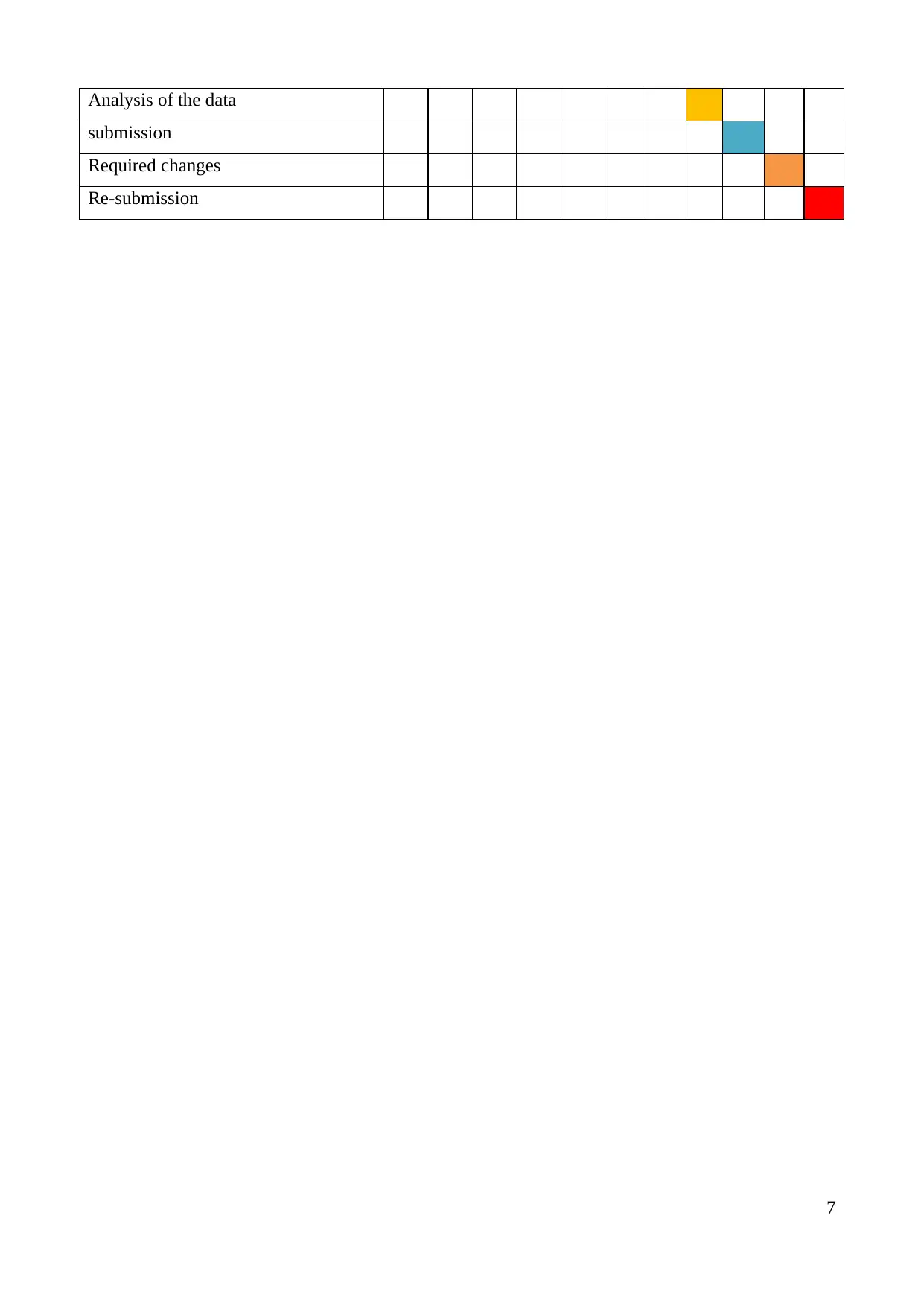
Analysis of the data
submission
Required changes
Re-submission
7
submission
Required changes
Re-submission
7
Paraphrase This Document
Need a fresh take? Get an instant paraphrase of this document with our AI Paraphraser
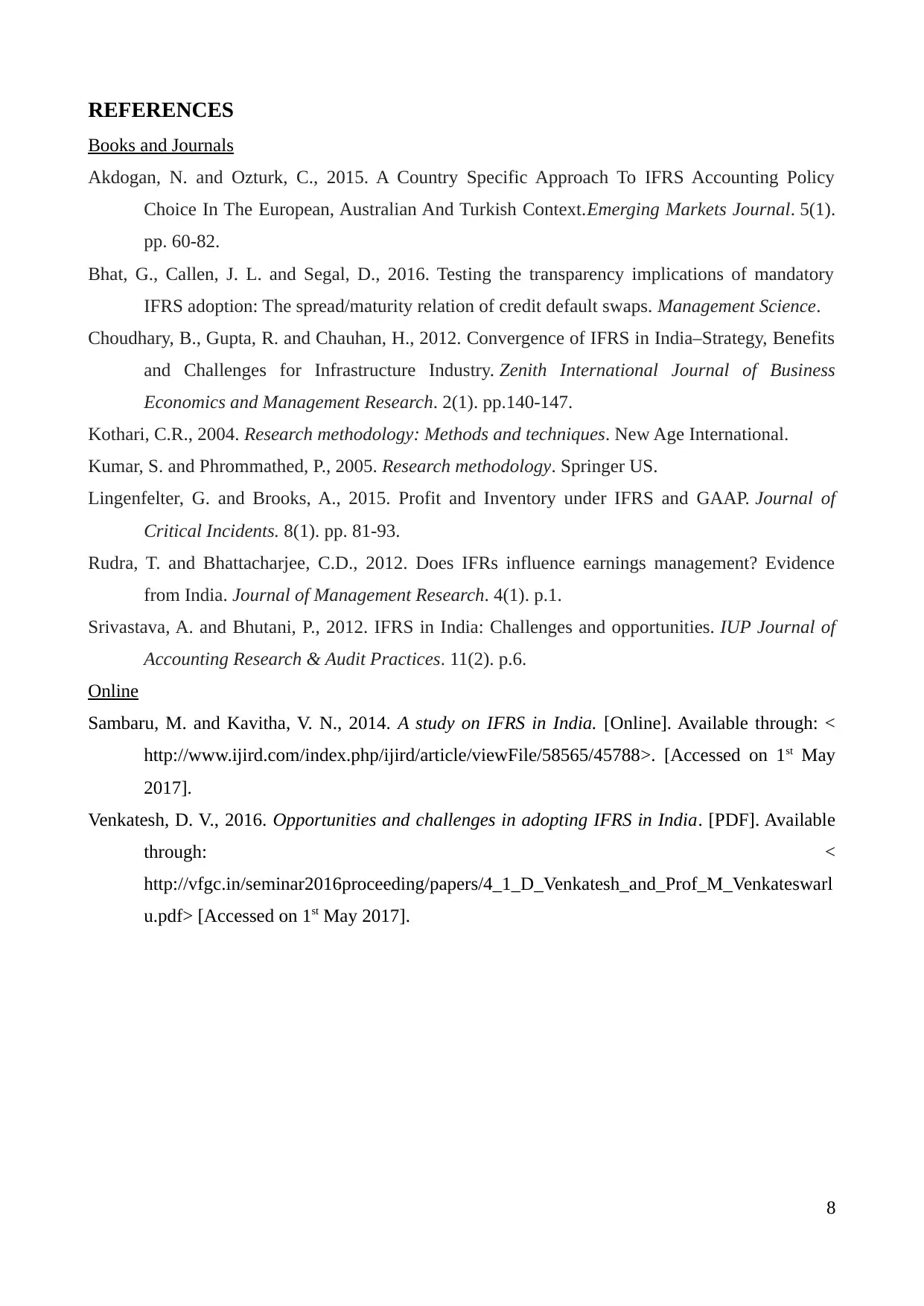
REFERENCES
Books and Journals
Akdogan, N. and Ozturk, C., 2015. A Country Specific Approach To IFRS Accounting Policy
Choice In The European, Australian And Turkish Context.Emerging Markets Journal. 5(1).
pp. 60-82.
Bhat, G., Callen, J. L. and Segal, D., 2016. Testing the transparency implications of mandatory
IFRS adoption: The spread/maturity relation of credit default swaps. Management Science.
Choudhary, B., Gupta, R. and Chauhan, H., 2012. Convergence of IFRS in India–Strategy, Benefits
and Challenges for Infrastructure Industry. Zenith International Journal of Business
Economics and Management Research. 2(1). pp.140-147.
Kothari, C.R., 2004. Research methodology: Methods and techniques. New Age International.
Kumar, S. and Phrommathed, P., 2005. Research methodology. Springer US.
Lingenfelter, G. and Brooks, A., 2015. Profit and Inventory under IFRS and GAAP. Journal of
Critical Incidents. 8(1). pp. 81-93.
Rudra, T. and Bhattacharjee, C.D., 2012. Does IFRs influence earnings management? Evidence
from India. Journal of Management Research. 4(1). p.1.
Srivastava, A. and Bhutani, P., 2012. IFRS in India: Challenges and opportunities. IUP Journal of
Accounting Research & Audit Practices. 11(2). p.6.
Online
Sambaru, M. and Kavitha, V. N., 2014. A study on IFRS in India. [Online]. Available through: <
http://www.ijird.com/index.php/ijird/article/viewFile/58565/45788>. [Accessed on 1st May
2017].
Venkatesh, D. V., 2016. Opportunities and challenges in adopting IFRS in India. [PDF]. Available
through: <
http://vfgc.in/seminar2016proceeding/papers/4_1_D_Venkatesh_and_Prof_M_Venkateswarl
u.pdf> [Accessed on 1st May 2017].
8
Books and Journals
Akdogan, N. and Ozturk, C., 2015. A Country Specific Approach To IFRS Accounting Policy
Choice In The European, Australian And Turkish Context.Emerging Markets Journal. 5(1).
pp. 60-82.
Bhat, G., Callen, J. L. and Segal, D., 2016. Testing the transparency implications of mandatory
IFRS adoption: The spread/maturity relation of credit default swaps. Management Science.
Choudhary, B., Gupta, R. and Chauhan, H., 2012. Convergence of IFRS in India–Strategy, Benefits
and Challenges for Infrastructure Industry. Zenith International Journal of Business
Economics and Management Research. 2(1). pp.140-147.
Kothari, C.R., 2004. Research methodology: Methods and techniques. New Age International.
Kumar, S. and Phrommathed, P., 2005. Research methodology. Springer US.
Lingenfelter, G. and Brooks, A., 2015. Profit and Inventory under IFRS and GAAP. Journal of
Critical Incidents. 8(1). pp. 81-93.
Rudra, T. and Bhattacharjee, C.D., 2012. Does IFRs influence earnings management? Evidence
from India. Journal of Management Research. 4(1). p.1.
Srivastava, A. and Bhutani, P., 2012. IFRS in India: Challenges and opportunities. IUP Journal of
Accounting Research & Audit Practices. 11(2). p.6.
Online
Sambaru, M. and Kavitha, V. N., 2014. A study on IFRS in India. [Online]. Available through: <
http://www.ijird.com/index.php/ijird/article/viewFile/58565/45788>. [Accessed on 1st May
2017].
Venkatesh, D. V., 2016. Opportunities and challenges in adopting IFRS in India. [PDF]. Available
through: <
http://vfgc.in/seminar2016proceeding/papers/4_1_D_Venkatesh_and_Prof_M_Venkateswarl
u.pdf> [Accessed on 1st May 2017].
8

9
⊘ This is a preview!⊘
Do you want full access?
Subscribe today to unlock all pages.

Trusted by 1+ million students worldwide
1 out of 9
Related Documents
Your All-in-One AI-Powered Toolkit for Academic Success.
+13062052269
info@desklib.com
Available 24*7 on WhatsApp / Email
![[object Object]](/_next/static/media/star-bottom.7253800d.svg)
Unlock your academic potential
Copyright © 2020–2026 A2Z Services. All Rights Reserved. Developed and managed by ZUCOL.




